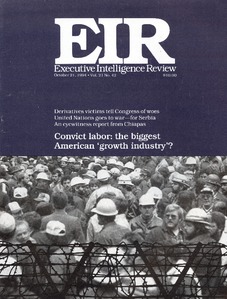Interviews
Muhammed Z. Nashashibi
by Muriel Mirak-Weissbach
The Finance Minister of the Palestinian National Authority was interviewed by Muriel Mirak-Weissbach during the international conference of the World Bank and International Monetary Fund in Madrid on Oct. 5.
Paul W. Keve
by Marianna Wertz
The leading author of The History of Corrections in Virginia taught at Virginia Commonwealth University until 1993, and before that worked in every area of corrections administration, from probation and parole, to prisons and juvenile institutions.
Benjamin J. Lambert III
by Marianna Wertz
Senator Lambert, a member of the Senate Finance Committee and of the Black Caucus of the Virginia General Assembly, was active in opposing the passage of Proposal X.
Fr. Luis Beltrán Mijangos
by Marivilia Carrasco and Hugo López Ochoa
The outspoken priest of San Cristóbal de las Casas diocese who has survived 20 years of persecution by Bishop “Comandante” Samuel Ruiz.
Reviews
Oligarchical Policy Is To Turn Our Youth into Human Garbage
by Rochelle Ascher
Former political prisoner Rochelle Ascher reviews Makes Me Wanna Holler: A Young Black Man in America, by Nathan McCall.
Where McFarlane Misses the Boat
by Edward Spannaus
A second installment of the review of Special Trust by Robert C. McFarlane and Zofia Smardz.
Departments
Agriculture
by Suzanne Rose
Espy Ouster “Not a Coincidence.”
Editorial
End the Killer Embargo.
Economics
U.S. Mobilization Stalls Biodiversity Treaty Vote
by Rogelio A. Maduro
The LaRouche political movement played a key role in mobilizing bipartisan forces against this keystone of plans to create a new world order through environmental regulations.
Derivatives Losses Are Piling Up Fast
by John Hoefle
Victims of Derivatives Losses Bring Tales of Woe to Congress
Testimony from the Government Finance Officers Association (GFOA); Odessa College, Odessa, Texas; Charles County, Maryland; and the Eastern Shoshone Tribe in Wyoming.
The Mideast Peace Plan Britain Wants To Abort
by H. Graham Lowry
The Middle East Needs Clean Nuclear Energy
by Muriel Mirak-Weissbach
An interview with Muhammed Z. Nashashibi.
Margaret Thatcher, George Bush Promote Voodoo Economics in Asia
by Kathy Wolfe
Thatchers Shaken by New Scandal in U.K.
by Mark Burdman
Caldera Rips ‘Green’ Hypocrisy at UN
by David Ramonet
U.S. Offers Pakistan Partnership in Energy; Won’t Rule Out Nuclear
by Saqlain Imam
Currency Rates
Business Briefs
Feature
America’s Prisons: Slave Labor for the New Age
by Marianna Wertz
With 1.3 million Americans in prisons and jails, the United States has the highest rate of incarceration of any “civilized” nation on Earth. Where is it all going? Take a look at the Virginia model, where parole is being ended, and an escape-proof pool is being created of young labor, working virtually without wages, in an age of shrinking budgets.
William Barr, the Bush Clique, and Their Friends at Dope, Inc.
by Anton Chaitkin
‘Private Prisons’ Is Newspeak for ‘Auschwitz’
by Marianna Wertz
‘Proposal X’ Will Fill Prisons, Not Affect Violent Crime
by Marianna Wertz
An interview with Paul W. Keve.
Virginia’s Prison Reform Means Genocide
by Marianna Wertz
An interview with State Sen. Benjamin J. Lambert III.
International
United Nations Goes to War for Serbia
by Katherine Kanter
On Oct. 7, in an action described by the London Times as “unprecedented,” but which has been ignored by western public opinion, UN Protection Forces troops drove about 550 Bosnian troops out of the demilitarized zone south of Sarajevo.
Order of the Solar Temple: A Multimillion-Dollar British-Run Lodge?
by Raynald Rouleau
New Evidence that Germany’s Barschel Was Murdered Comes to the Fore
China’s Nuclear Test: Empire Smiles Back
by Ramtanu Maitra and Susan Maitra
Colombian Military Resists Plot To Dismantle Armed Forces
by Javier Almario
Documentation: From a Sept. 29 national television broadcast by the Ibero-American Solidarity Movement in Colombia.
Future of Mexico Is At Stake in Chiapas
by Marivilia Carrasco and Hugo López Ochoa
An exclusive report from the southern state racked by “indigenous” uprisings.
Bishop Samuel Ruiz Is the ‘Comandante’
by Marivilia Carrasco and Hugo López Ochoa
An interview with Fr. Luis Beltrán Mijangos.
The Origins of the Balkan War
by Srecko Jurdana
By a Croatian journalist and military expert.
International Intelligence
National
British Mideast Subversion Also Aimed at Clinton
by Edward Spannaus
The renewed crisis in the Persian Gulf has little to do with Iraq as such, but comes in the context of British efforts to destabilize Saudi Arabia, and meshes with British efforts to bring down President Clinton.
LaRouche’s Design for U.S. Policy Could Still Save Russia from Disaster
On Oct. 12, 1988, Lyndon LaRouche, at a Berlin address, specified a policy for freeing Russia and the communist bloc from impending economic collapse, by cooperative “Food for Peace” agreements with the West. The timeliness and urgency of his proposals are indisputable.
American Legion Demands Museum Whitewash Hiroshima Bombing
by Carol White
Hysteria May Sink North’s Senate Bid
by Nancy Spannaus
Dope, Inc.’s Weld Up for Re-Election
by William Ferguson
Congressional Closeup
by Carl Osgood
National News



